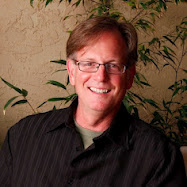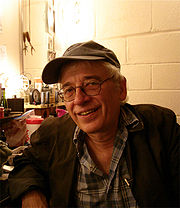A PRIMER FOR THE AMATEUR AND THE PRO.
You are taking a scene study class. It might be your first ever, or it may be that you are returning to acting class for the first time since high school or a course you took in college. Perhaps you are pursuing an acting career in Los Angeles, and you have taken a plethora of courses: Scene study, cold reading workshops, on-camera audition technique, improv, etc., etc. Maybe you have never studied acting, you have studied with one teacher, or you’ve studied with more than you can remember. Maybe you’re a working actor, and you’ve been on a successful television series for 11 years. It’s just been cancelled, and you find yourself auditioning again. Now that you have the time, you want to pursue some theater work, but first, you want to get back into a class and polish some rusty skills you haven’t used in a while. Whatever your situation, no matter how little or how much experience you have, it is always helpful to either learn, or reexamine and reaffirm, the basics.
My father touches upon this idea with an anecdote in his book, An Improvised Life, A Memoir, (I know, a shameless plug for the old man, but what can I say, I try to do what I can to help him out). He tells of a conversation he had with the golfer Arnold Palmer in which he asked him what he does to deal with the enormous pressure that is part of a professional tournament:
What do you do when you feel that?” I asked. “I go back to basics,” he said easily. Of course. It’s what he would have to have said. Keep your eye on the ball. Breathe. One of the greatest golfers in history, and he’s not ashamed to go back to the beginning. To start all over again each time he goes out to play.
Get a Journal.
If you don’t already have a journal or a notebook that you are using for your class, get one. I am partial to the ubiquitous marbled composition books that we all know so well. They’re inexpensive, and if you’re really pursuing this craft, you’re going to be going through a lot of them. Have it by your side all the time as you go through your work, whether it’s in class, when you’re alone examining the text and the character, or in your rehearsals with your partner.
Read The Play.
The first thing you must do after your teacher assigns you a scene is read the play. The whole play. This I consider a hard and fast rule, with absolutely no exceptions. Now some of you reading this may be thinking, “Really, he had to tell us that? Of course we have to read the whole play. Who would think we didn’t?” Well, I’ll tell you. After several years of teaching, the answer is, “Many, many more students than you would like to think.” If you already have a firm grasp on this and don’t need it explained, or you think it is too elementary, feel free to skip ahead to the next section. Why must you read the whole play? Here’s a story that might help to explain: I was once teaching at an acting school that shall remain nameless, and one evening I received a telephone call from the director of the school.
“I have to ask you something,” he said.
“Shoot,” I said.
“Why are you only allowing students to do scenes from plays you have read?”
I sighed and groaned, very loudly, but only on the inside. Clearly, he had gotten a complaint from one of the students regarding some very strong criticism I had leveled in class that day. The student had been working on what I call “The Hot Dog Scene,” from Angels in America. He was playing Joe Pitt, and at one point in the scene, when Louis was talking about how his friend is ill, the actor playing Joe put his hand on his arm, attempting to console him. I immediately stopped the scene. I knew in that moment that he hadn’t read the play. He didn’t know that Joe was gay, and hiding it. I asked him if he had read the play and he said no. I said, “You have to read it.” He said, “The whole thing?” And then I had some choice words for him.
Back to my phone call with the director of the school: “Well,” I said to him, “as I have explained several times to the class, when I assign a scene from a play, they have to read the whole play, and …”
He cut me off. “Why?”
Another sigh and groan from me, and I think that the sigh might have been audible. “Because, even if I assign the first scene of the play, if the last line of the play involves your character saying something like, oh, I don’t know, let’s say it’s, ‘But Mom, I’m GAY!’ followed by a blackout, that is perhaps information that you need about your character even if you are only working on the first scene.“
“Oh, I get it,” the director of the school replied after a moment’s thought. “But then how come they can only do scenes from plays that you have read?”
Another sigh, another groan. This time, both were audible. “Because it is also information that I, the teacher, also need to have if I am going to effectively guide the student through the scene.”
“Oh. Okay,” he said. He clearly didn’t like it, but he couldn’t argue with it, and so he had to go back to the disgruntled student and explain that, yes, learning how to act was indeed going to take some effort on his part.
It is a good idea, if possible, to read the whole play in one sitting, since that is how they are meant to be experienced. At scene breaks, if there are any, close your eyes for a brief moment. Take a few breaths, then read on. If there is an intermission, go ahead and take it. Go to the bathroom, have a cookie or a glass of water, then get back to the play. Don’t have a drink with alcohol. Stay present with the story, attuned to which characters, themes, and events resonate with you, and which do not. You may have your journal near at hand as you read, but I would recommend against jotting things down as you go through this first read process. Rather, give yourself the gift of an uninterrupted read so that you can have the experience of the play.
Begin Your Analysis of the Text.
When you are done reading the play the first time, now you can go through it again, jotting down notes and questions. Look up definitions of words you don’t know, check Wikipedia for information on references you don’t understand. Make sure you can follow the timeline of the piece, both internal and external, and where it takes place geographically. If the play does not take place in the present day, when does it take place? If the geographical setting is significant, do some research. A friend of mine, Gene Franklin Smith, wrote a play called Boise, USA, that takes place in, you guessed it, Boise, USA. It deals with a scandal and witch hunt circling around the investigation and allegations of child abuse and homosexuality in this Midwestern town in the ’50’s. Do some research. If you type “Boise” and “homosexuality” into Google, the autofill prompts you to “Boise homosexuality scandal,” and if you click on that, you get more than 500,000 hits that bring you to a wealth of information. This is a very simple example of how you can do research and where you can begin your inquiries. Use your imagination, and follow it wherever it might lead you for background on the time, place, and society that surround the events of your text.
During this process, you now want to have your journal by your side, and use it to jot down facts, ideas, observations and further questions … always, further questions. Use your imagination. Ask yourself questions about your character, even if they seem at first irrelevant to the issues at hand in the play. If you can’t think of enough questions yourself, turn to Google again, and type in “acting character questions” and look at how many hits you get. Any of those results will be fertile ground and yield rich results.
As you continue on your research on your role, (and it should be a continuous process, no matter how long you are working on the role), don’t be too rigid in your approach. Keep your spirit attuned to the happy accident. More than twenty years ago I was in rehearsal for the play Two Rooms, by Lee Blessing, playing Walker, a reporter pursuing a story from a woman whose husband is being held hostage in Beirut. I figured that Walker would be incredibly well versed in what was going on in the Middle East with kidnappings and terrorism, so I started to wade my way through two books,From Beirut to Jerusalem, by Thomas L. Friedman, and A Peace to End All Peace, by David Fromkin. Weighty tomes, both of them. Reading them was daunting work, and while I found that I was learning a lot about the forces leading to the tensions and crises in that part of the world, it didn’t seem to be helping me with the work of the play, which after all required human relationships between the actual characters. Then one day in a bookstore, an interesting title caught my eye, and I took the book down off the shelf. It was The Journalist and the Murderer, by Janet Malcolm, and it examined the complicated relationship between the journalist and his subject, as they spend time together while the journalist is gathering the information for work. Now that was what I needed, and it ended up informing my performance in that play in a profound way, and changing the way I work to this day. My approach now is to find and inform myself on as much of the world of the play as I can, focusing on such aspects as will influence mycharacter and my behavior. Such inquiry deepens not only my work as an actor, but also my view of, and relationship to, the people and the world around me. That is the greatest reward that this career has to offer: An eye-opening quest for a greater understanding of humanity.
In the next post, Part 2: The First Rehearsal.
You can listen to my father discussing his book An Improvised Life, A Memoir, in an interview on NPR’s Talk of the Nation here, or if you are interested in ordering a copy, you can follow this link to Amazon.




 RSS Feed
RSS Feed